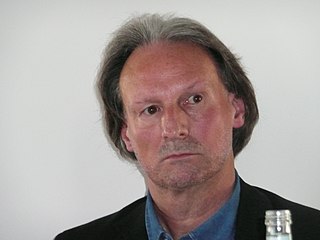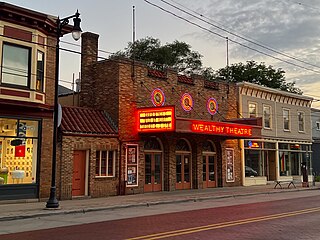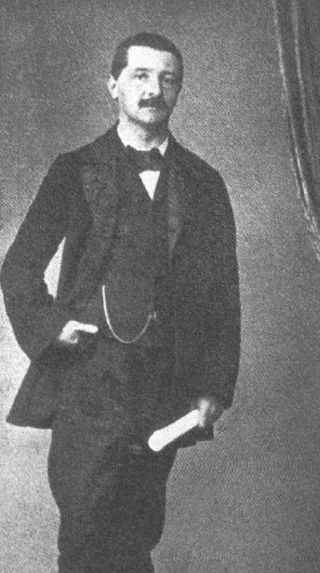
Babelsberg Film Studio, located in Potsdam-Babelsberg outside Berlin, Germany, is the second oldest large-scale film studio in the world only preceded by the Danish Nordisk Film, producing films since 1912. With a total area of about 460,000 square metres (5,000,000 sq ft) and a studio area of about 25,000 square metres (270,000 sq ft) it is Europe's largest film studio.

Ways to Strength and Beauty is a 1925 German cultural film directed by Wilhelm Prager. The 125 minute full-length silent film was produced by Ufa-Kulturabteilung of Weimar Germany. The film was first screened on 16 March 1925 and in a revised version on 11 June 1926 in the Ufa-Palast am Zoo in Berlin.

Kevin Wayne Van De Wege is an American firefighter and politician serving as a member of the Washington State Senate, representing the 24th district since 2017. A member of the Democratic Party, he previously served as a member of the Washington House of Representatives from 2007 to 2017. His district includes much of the Olympic Peninsula, which is made up of Clallam County, Jefferson County, and half of Grays Harbor County, and includes Forks, Hoquiam, Port Angeles, Port Townsend, Sequim, McCleary, Elma, and Ocean Shores.

Karl Theodor Maria Georg Achaz Eberhardt Josef Freiherr von und zu Guttenberg was a German politician of the Christian Social Union of Bavaria (CSU). He was parliamentary secretary of state in the Chancellor's Office in the government of Kurt Georg Kiesinger from 1967 until 1969, as well as the foreign policy spokesman of the CDU/CSU group in the Bundestag. Guttenberg was perceived as a hardline conservative anticommunist as well as a convinced proponent of European integration. His work was mostly within the field of foreign policy.

Jürg Amann was a Swiss author and dramatist. He has written radio plays, a biography of Robert Walser, and other works.

Johann Sebastian Bach composed the church cantata Bereitet die Wege, bereitet die Bahn, BWV 132, in Weimar in 1715 for the fourth Sunday of Advent and led the first performance on 22 December 1715.

Wealthy Theatre is a historic movie theatre and performance center in Grand Rapids, Michigan. It is currently operated by the Grand Rapids Community Media Center, a non-profit corporation. Wealthy Theatre is a mixed-use facility, capable of hosting live music, film, theatre and dance.

Bruckner's Psalm 22, WAB 34, is a setting of a German version of Psalm 23, which was psalm 22 in the Vulgata.
Deutscher Science Fiction Preis is a German literary award. Together with the Kurd-Laßwitz-Preis, it is one of the most prestigious awards for German science fiction literature. The award was established in 1985 by the Science Fiction Club Deutschland, a German Science Fiction society. Each year, the award is given to the best German science fiction short story and the best German novel from the previous year.
Edwin Jay "Bud" VanDeWege, Jr. is a former American basketball coach. He was the head coach of the Michigan Wolverines women's basketball team from 1984 to 1992, compiling a record of 93–132 in eight seasons at Michigan. After leading the team to its first 20-win season and its first NCAA Tournament appearance, he was named Big Ten Coach of the Year in 1990. He is the second winningest head coach in the history of Michigan's women's basketball program.
"Herzlich tut mich verlangen" is a German hymn, with lyrics written in 1599 by Christoph Knoll, with a melody adapted from a secular song by Hans Leo Hassler. It is a prayer for a blessed death, beginning "Herzlich tut mich verlangen nach einem sel'gen End". Its hymn tune, Zahn No. 5385a, was later also used for Paul Gerhardt's "Befiehl du deine Wege" and "O Haupt voll Blut und Wunden".
Wege is a surname. Notable people with the surname include:
"Befiehl du deine Wege" is a Lutheran hymn by Paul Gerhardt. It is one of his best known hymns, and was first published in 1653 in Johann Crüger's collection of hymns and popular religious songs Praxis pietatis melica.

Xanthe Canning is a fictional character from the Australian soap opera Neighbours, played by Lilly Van der Meer. The character's introduction was teased by actress Colette Mann, who plays Sheila Canning, during an interview in October 2015. Van der Meer's casting was announced the following month. She taped her first audition for the part at her home. Van der Meer learned she had won the role during her school lunch break, and she relocated from Queensland to Melbourne for filming. Xanthe is the granddaughter of Sheila Canning and the half-sister of Kyle Canning. She made her first appearance during the episode broadcast on 22 January 2016. In December 2018, it was confirmed that Van der Meer had relocated to Los Angeles, leading to her exit from the show. Xanthe made her final appearance on 8 January 2019.

The Headline Goal 2010 was a military capability target set by the European Council in June 2004 after the previous Helsinki Headline Goal had been completed in 2003.
Teimiussa, also spelt Teimioussa or Timiussa, also known as Tristomon, was a port town of ancient Lycia, near the ancient settlement Tyberissus. The name is not attested in history, but is derived from epigraphic and other evidence. This combination of harbor and inland location is the focus of archaeological exploration. Among the finds are ancient tombs.
Tyberissus or Tyberissos, also Tyberisus or Tyberisos, was an inland town of ancient Lycia, near the ancient settlement of Teimiussa that functioned as its port. The name is not attested in history, but is derived from epigraphic and other evidence. This combination of harbor and inland location is the focus of archaeological exploration. Among the finds are tombs with Lycian inscriptions. Coins inscribed "ΤΥ" of typical Lycian type were probably minted here.
Wege der Forschung is the name of a historic interdisciplinary book series about topics of humanities, first published by Hermann Gentner Verlag in Bad Homburg, later by Wissenschaftliche Buchgesellschaft in Darmstadt. The most important contributions of various authors from the history of research were compiled on a single topic – usually in chronological order. Generally, the essays were already published before, such as in scientific journals; in some cases, however, they were first publications. The series appeared from 1956 to 1995 and comprised 657 volumes. The successor series of the publishing house, which has been published since 2000, is called Neue Wege der Forschung.

Ways to a Good Marriage is a 1933 German drama film directed by Adolf Trotz and starring Olga Tschechowa, Alfred Abel and Hilde Hildebrand. It was shot at the EFA Studios in Halensee in Berlin. The film's sets were designed by the art directors Heinz Fenchel and Botho Hoefer. The film was based on the ideas of the sexologist Theodore H. Van de Velde and was in the tradition of the enlightenment films of the Weimar Republic. Although his work had already been forbidden by the new Nazi regime, it was not formally banned until 1937 despite protests by Nazi students in Kiel who were successful in having the film pulled from cinemas there.










